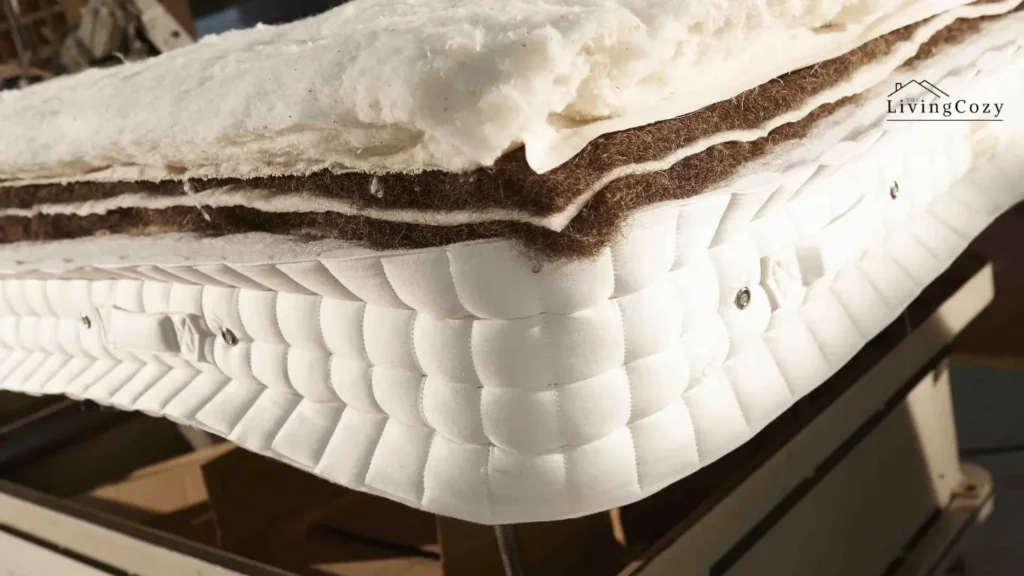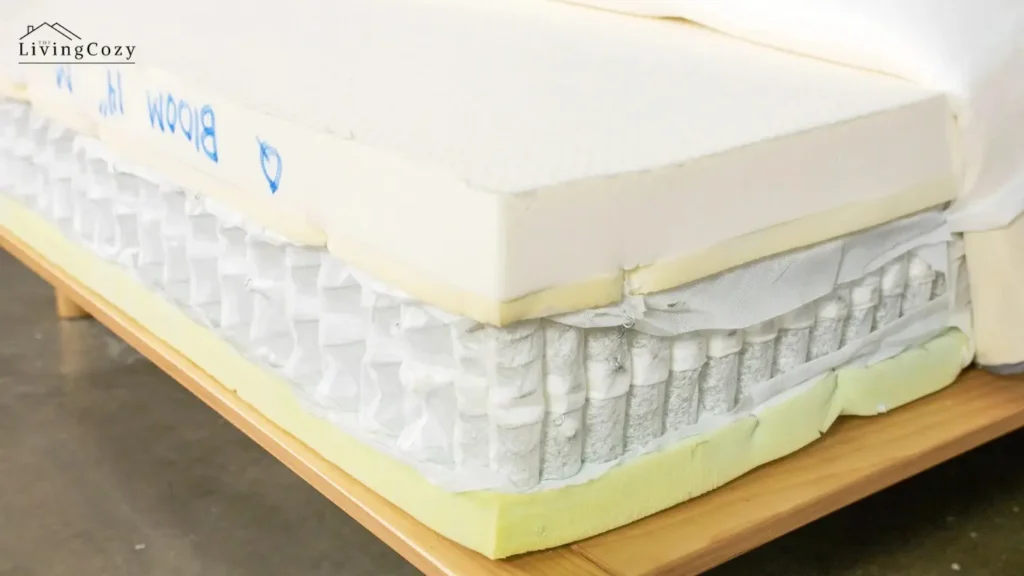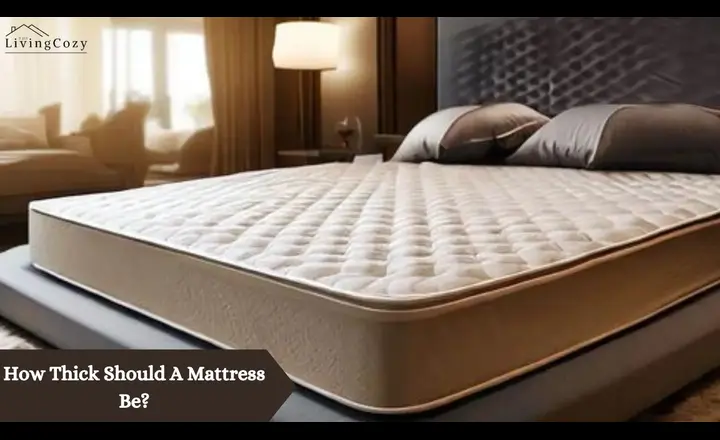Here, you will be informed of how thick should a mattress be. Most mattresses tend to be between 12 and 14 inches thick. Children or petite individuals may find a thinner mattress, around 8-10 inches, sufficient for their needs.
Below, we are giving you more information about a complete mattress thickness and how thick a mattress should be. So let’s start:
Mattress Thickness Overview:
| Thickness | Type | Good For |
|---|---|---|
| 2 to 5 inches | Low Profile | Cribs Rollways or trundle beds |
| 5 to 8 inches | Slim | Children’s beds Short adults People with limited mobility |
| 8 to 12 inches | Standard | Most adults Back and stomach sleepers Guest bedrooms |
| 12 to 20 inches | Thick, Deep, or Tall | Side Sleepers Heavy Sleepers |
| 20+ inches | Extra Thick, Extra Deep, or Extra Tall | Typically unnecessary for all sleepers |
How Thick Should A Mattress Be: Mattress Thickness Chart:
The right mattress thickness can make all the difference in your sleep experience, affecting everything from support to comfort.
2 to 5 inches (Low Profile):
A low-profile mattress, ranging from 2 to 5 inches in height, can be a great option for certain situations.
For example, if you have a platform bed with a low headboard or want a minimalist look, a low-profile mattress can provide the sleek and modern aesthetic you desire.
These mattresses are often used in RVs, campers, and other compact living spaces where space is limited.
5 to 8 inches (Slim):
A slim mattress, typically 5 to 8 inches thick, can be a great option for certain situations.
For example, it can be ideal for bunk or trundle beds with limited space and a thinner mattress.
A slim mattress can be a good choice for people who prefer a firmer sleeping surface or those with specific health needs requiring a more supportive bed.
8 to 12 inches (Standard):
The standard thickness of 8 to 12 inches is a popular choice. This range offers a good balance of support and comfort, making it suitable for most sleepers.
A mattress in this thickness range typically provides adequate cushioning and support for a restful night’s sleep without feeling too bulky or overwhelming.
12 to 20 (Thick, Deep, or Tall):
The thickness of a mattress can greatly impact your comfort and support. A 12 to 20-inch mattress is considered deep or tall, providing ample cushioning and support for a restful night’s sleep.
The thicker the mattress, the more padding and support it typically contains, which can benefit those who prefer a plush sleeping surface.
20 inches or more (Extra Thick, Extra Deep, or Extra Tall):
When choosing a mattress, opting for one that is 20 inches or more in thickness can provide extra comfort and support.
This type of mattress is often referred to as extra thick or extra deep, and it can be particularly beneficial for individuals who prefer a higher bed height or those with mobility issues. The added height can make getting in and out of bed easier and provide a luxurious feel.
What Makes Up Your Mattress?
A typical mattress comprises several layers, each serving a specific function to provide comfort and support.
Comfort layer:

The comfort layer of a mattress is often the first thing that comes to mind when people think about getting a good night’s sleep. This layer is designed to provide the initial softness and cushioning, creating an inviting surface for relaxation and relief from daily pressures.
It’s important to realize that the comfort layer is not just about plushness; it also plays a critical role in supporting proper spinal alignment and pressure relief.
With the right comfort layer material – whether it’s memory foam, latex, or hybrid options – individuals can tailor their sleeping experience to fit their individual needs.
Support layer:

The support layer of a mattress is like the backbone of your sleeping experience, providing crucial stability and comfort. The soft top layers cushion your body. The support layer is all about maintaining proper spinal alignment and distributing your weight evenly.
One important feature to look for in a support layer is its firmness level – it should be able to contour to your body while still offering solid support.
Thicker mattresses can be difficult to manoeuvre:
Thicker mattresses can be more challenging to manoeuvre, especially when moving them up staircases or through narrow doorways.
Their increased weight and bulkiness can make them harder to handle, requiring more effort and possibly additional assistance.
It’s important to consider the logistics of transporting a thicker mattress, especially if you anticipate moving it frequently or in tight spaces.
Why are mattresses so thick nowadays?
Mattresses have become thicker in recent years due to technological advancements and materials used in their construction. Thicker mattresses often incorporate multiple layers of foam, gel, and other supportive materials to provide better comfort and support for sleepers.
These advancements have allowed manufacturers to create mattresses with improved pressure relief, spinal alignment, and sleep quality.
What size bed sheets fit a 10-inch mattress?
For a 10-inch mattress, you would typically want to look for fitted sheets labelled as deep pockets or extra deep pockets. These sheets accommodate thicker mattresses and provide a snug fit without slipping off.
Look for sheet sets specifically designed for 10-12 inch mattresses to ensure the best fit.
It’s important to check the dimensions of the sheets before purchasing to ensure they will adequately cover the mattress.
Most standard queen and king size sheets should be suitable for a 10-inch mattress, but always double-check the measurements to be certain.
Conclusion For How Thick Should A Mattress Be:
In the end, we will talk about how thick should a mattress be. A mattress 10-12 inches thick tends to provide a good balance of support and comfort for most people. The thickness of a mattress is a crucial factor in determining your comfort and sleep quality.
Finding the right balance between support and softness is essential for a restful night’s sleep. Consider your body size, sleeping position, and personal preferences when choosing the thickness of your mattress.
With these factors, you can select a mattress thickness that caters to your needs and promotes better sleep. Take the time to research and test different options before deciding, as investing in the right mattress thickness can significantly impact your overall well-being.
FAQ’s:
What is the ideal Thickness for a Comfortable Mattress?
The ideal thickness for a comfortable mattress varies from person to person but generally ranges from 8 to 12 inches.
Are there any benefits to Choosing a Thicker Mattress?
Thicker mattresses often provide enhanced cushioning and pressure relief, benefiting those with joint or back pain.


